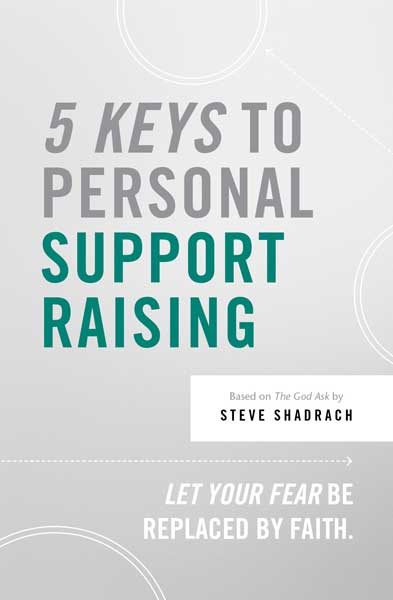What’s a support-raising Christian worker to do when things get so bad it’s more appropriate to spell it ickonomy rather than economy?! Should you do the “security shuffle,” scrambling to interview for church staff or secular positions? Afraid not. They’re slashing budgets and employees too! Yes, some of your donors’ 401K’s turned into 201K’s overnight, but God is still in control, and clinging to the six pillars I list below may help you weather the financial tornadoes intent upon wreaking havoc on the economy…and our support teams!
1. Review your calling
Go back and remember when and how God led you into this ministry and reaffirm that conviction. When you get to heaven someday and review the tapes of your life, the Lord may ask, “Do you want to view the good times first or the bad?” Guess what? From God’s perspective, these tumultuous, faith-stretching experiences may be part of the “Good Times Highlight Reel!”
2. Don’t panic
Do not send out crisis letters. People might respond once, but if you ever do it again they’ll conclude: “Either this Christian worker doesn’t know how to manage their money or they need to raise more support.” Ron Frey, veteran fundraiser, asks: “Can we count on the resiliency of our economy or the good will of the American people to support our causes?” My answer is a resounding NO! Even though the nightly news feeds peoples’ fear by likening our situation as The Great Depression 2, our security is in God, and God alone!
3. Diversify your ministry partners
Those whose main support comes from a few big “sugar daddy’s” may be in trouble when the economy tanks. For you, spread out to different cities and states, seeking to add a steady flow of new givers, even if they’re just $50, $75, or $100 a month gifts. Creating a broader base of 100 monthly donors provides so much more long-term stability than hanging your hopes on five big hitters promising to tithe from their end-of-the-year real estate deals! And studies show people are less likely to cut back on a monthly commitment they have made to an individual Christian worker than they are a general gift to a church or charity.
4. Focus on essentials, not electives
Kill your debt. Don’t take on any new debt. Build up your savings account. Repair stuff rather than replace. Get creative. Plant a garden. Pool the whole family’s incomes and expenses. Work together, and just like your struggling supporters, prayerfully distinguish between your wants and your needs.
5. Empathize with your supporters
Acknowledge to your givers the economy is suffering and they may have been affected. Ask what you can pray for them about. Be sensitive to their losses and pressures, never demanding they give, but with appreciation and humility asking them to continue to invest in God’s work through you. During these tough times, Ellis and Colleen Goldstein with Campus Crusade have committed to pray for different supporters each night and then send them a postcard telling them they did so.
6. Keep the ministry vision central
Scott Morton with the Navigators says, “We must remember we are inviting supporters to advance the Kingdom, not merely to meet our personal needs.” YWAM’s John Ray adds: “Let’s help our supporters process what is really valuable and how their investments cannot be affected by the stock market or economy.” Veteran fundraising consultant Bill McConkey shares, “We should all be making Jesus the Lord of our asset base so it goes into the Kingdom now, and when we get to heaven, God won’t have to ask us why we were such hoarders!” Finally, knowing your donors want their tightly-squeezed giving dollars to be the most strategic possible, you may want to evaluate your mission statement in order to put forth the most compelling case for support possible.

